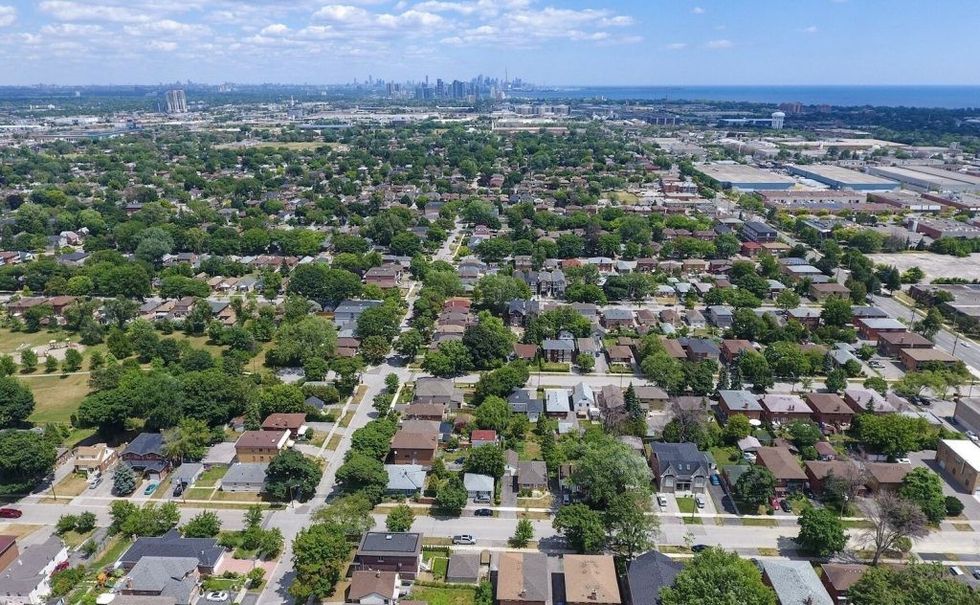The relentless housing affordability crisis -- and a focus on supply (or lack thereof) -- was front and centre at this morning's Ontario housing summit.
Today, Premier Doug Ford took a break from (an attempt at) shovelling snow to host a virtual housing summit with Municipal Affairs and Housing Minister Steve Clark and the mayors of Ontario's 29 largest municipalities.
“Young families, seniors, and all hardworking Ontarians are desperate for housing that meets their needs and budget,” acknowledged Premier Ford. “At a time when our province is growing, our government will continue to use every tool we have to help municipalities get more homes built faster to help more families realize the dream of home ownership.”
The solution seemingly lays in ramping up the speed of supply.
To kick things off, Ford promised funds to speed up development approvals in municipalities. The premier said that the province will provide more than $45 million via a new fund to streamline approvals and reduce the red tape that results in exceptionally long wait times to bring new housing and industrial projects to market.
READ: You Better Get Used to All These “Ordinary” Houses Selling for $1M
The Streamline Development Approval Fund will help Ontario’s 39 largest municipalities modernize, streamline, and accelerate processes for managing and approving housing applications. For example, they can use the funds to implement online systems that make it easier for applicants to navigate the development approvals process, manage their applications, and receive timely status updates, says the Province.

"While the solutions may seem obvious, implementing them takes a lot of hard work and determination,” said Ford.“ We know we need to better standardize processes and procedures across regions, and we know we need to improve data collection and reporting so we can better track progress where we can do better.”
Ford says that tacking the province's affordability crisis will require a coordinated approach that involves all levels of government. But changes won't happen overnight.
“After a decade of mismanagement and inaction under the previous government, the housing crisis in Ontario will not be solved overnight or in one meeting -- addressing housing supply is a long-term strategy that requires long-term commitment, collaboration, and coordination,” said Minister Clark. “Today’s summit was an important next step to identify what additional measures we can take to increase the supply of housing and make it easier for Ontarians and their families to find a home that meets their needs and budget. As we continue this dialogue, our government will ensure municipalities have the tools and resources they need to unlock housing in every community across Ontario.”
The government also announced over $8M through the Audit and Accountability Fund to help large urban municipalities identify potential savings and efficiencies through third-party reviews to further accelerate the creation of new housing and modernize municipal services to build homes faster.

Furthermore, the Province also said it would work with the municipal sector to develop a data standard for planning and development applications to help accelerate approval timelines. "Built with municipalities, data standardization will help improve the quality of data, create consistency across systems, make it easier to measure results, reduce costs for business and governments, and support municipalities’ transition to digital service delivery and digital approvals," said the Province in a press release. This work is part of the Ontario Data Authority initiative, designed to accelerate Ontario’s economic and social growth through improved data sharing.
Ford's government also announced a housing affordability task force to explore measures to increase housing supply, cut red tape in bringing new product to market, and other strategies to make it more attainable for families to buy homes. This task force will be comprised of industry leaders, including those in not-for-profit housing, Indigenous housing, and economics. A report that outlines its recommendations is expected to be published early 2023.
The report can't come soon enough, however. According to Ontario's fall economic statement, year-to-date home starts were 16% than in 2020, with rental housing starts 14% higher. Throughout southern Ontario in particular, paying $1 million for a very ordinary house has now become the norm.





















